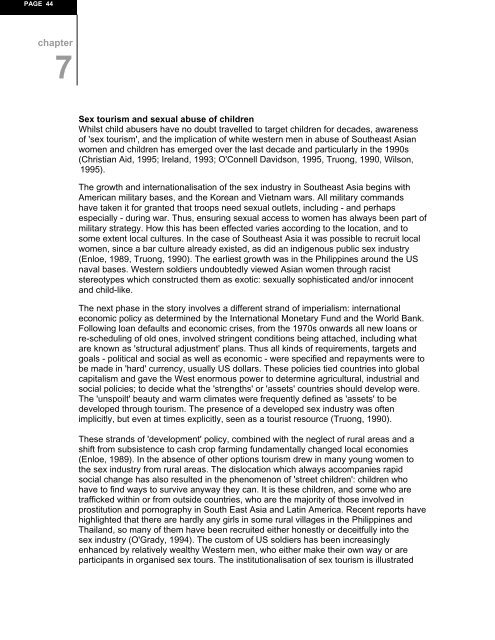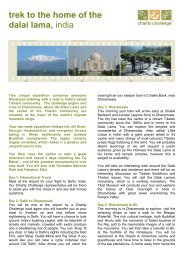Splintered Lives - Barnardo's
Splintered Lives - Barnardo's
Splintered Lives - Barnardo's
You also want an ePaper? Increase the reach of your titles
YUMPU automatically turns print PDFs into web optimized ePapers that Google loves.
PAGE 44<br />
chapter<br />
7<br />
Sex tourism and sexual abuse of children<br />
Whilst child abusers have no doubt travelled to target children for decades, awareness<br />
of 'sex tourism', and the implication of white western men in abuse of Southeast Asian<br />
women and children has emerged over the last decade and particularly in the 1990s<br />
(Christian Aid, 1995; Ireland, 1993; O'Connell Davidson, 1995, Truong, 1990, Wilson,<br />
1995).<br />
The growth and internationalisation of the sex industry in Southeast Asia begins with<br />
American military bases, and the Korean and Vietnam wars. All military commands<br />
have taken it for granted that troops need sexual outlets, including - and perhaps<br />
especially - during war. Thus, ensuring sexual access to women has always been part of<br />
military strategy. How this has been effected varies according to the location, and to<br />
some extent local cultures. In the case of Southeast Asia it was possible to recruit local<br />
women, since a bar culture already existed, as did an indigenous public sex industry<br />
(Enloe, 1989, Truong, 1990). The earliest growth was in the Philippines around the US<br />
naval bases. Western soldiers undoubtedly viewed Asian women through racist<br />
stereotypes which constructed them as exotic: sexually sophisticated and/or innocent<br />
and child-like.<br />
The next phase in the story involves a different strand of imperialism: international<br />
economic policy as determined by the International Monetary Fund and the World Bank.<br />
Following loan defaults and economic crises, from the 1970s onwards all new loans or<br />
re-scheduling of old ones, involved stringent conditions being attached, including what<br />
are known as 'structural adjustment' plans. Thus all kinds of requirements, targets and<br />
goals - political and social as well as economic - were specified and repayments were to<br />
be made in 'hard' currency, usually US dollars. These policies tied countries into global<br />
capitalism and gave the West enormous power to determine agricultural, industrial and<br />
social policies; to decide what the 'strengths' or 'assets' countries should develop were.<br />
The 'unspoilt' beauty and warm climates were frequently defined as 'assets' to be<br />
developed through tourism. The presence of a developed sex industry was often<br />
implicitly, but even at times explicitly, seen as a tourist resource (Truong, 1990).<br />
These strands of 'development' policy, combined with the neglect of rural areas and a<br />
shift from subsistence to cash crop farming fundamentally changed local economies<br />
(Enloe, 1989). In the absence of other options tourism drew in many young women to<br />
the sex industry from rural areas. The dislocation which always accompanies rapid<br />
social change has also resulted in the phenomenon of 'street children': children who<br />
have to find ways to survive anyway they can. It is these children, and some who are<br />
trafficked within or from outside countries, who are the majority of those involved in<br />
prostitution and pornography in South East Asia and Latin America. Recent reports have<br />
highlighted that there are hardly any girls in some rural villages in the Philippines and<br />
Thailand, so many of them have been recruited either honestly or deceitfully into the<br />
sex industry (O'Grady, 1994). The custom of US soldiers has been increasingly<br />
enhanced by relatively wealthy Western men, who either make their own way or are<br />
participants in organised sex tours. The institutionalisation of sex tourism is illustrated
















